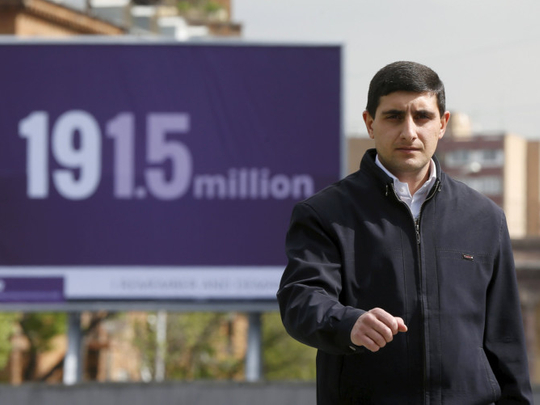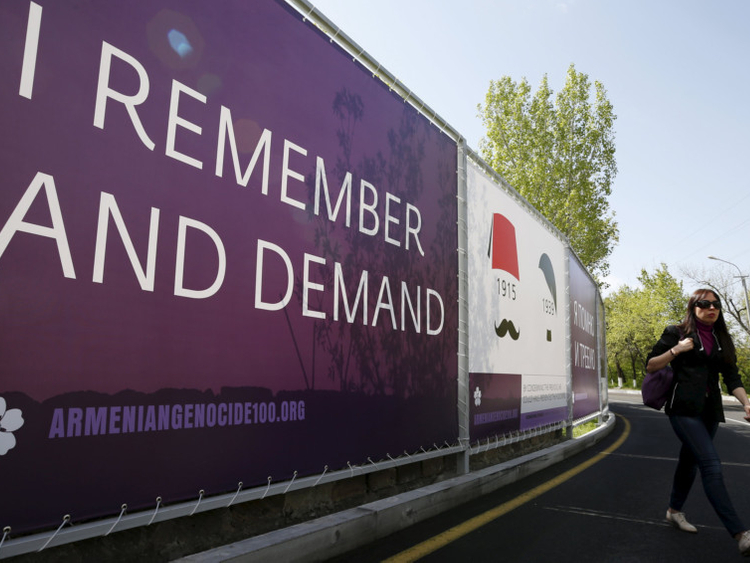
Yerevan: More than 600 delegates gathered in the sprawling Karen Demirchyan Sports and Concerts Complex in Yerevan, the capital of Armenia, in the past two days for a global forum dedicated to the study of the genocide phenomenon.
Titled ‘International social and political global forum against the crime of genocide’, the gathering assembled historians, politicians and religious leaders to talk about the Armenian genocide, which the Government of Turkey denies, as well as its legacy on the rest of mankind.
The forum was convened by Serzh Sargsyan, President of Armenia, who not only stressed that “remembrance [was] a moral obligation” as well as a “duty and right to commemorate the one-and-a-half million victims,” but that many conscientious objectors throughout history stood up against genocide from within, including Irena Sendler and Raoul Wallenberg during the Holocaust, Paul Rusesabagina during the Rwandan genocide and Van Chhuon during the Cambodian genocide.
In what was a surprise, the president emphasised that Armenians have not forgotten and are grateful to Kurds and Turks who covertly saved the lives of their Armenian neighbours.
He also thanked the “Arab people, who gave shelter to those who had narrowly escaped the Turkish yatagan, as well as the Russians, Americans and Europeans, who took care of the Armenian orphans or partook in the humanitarian efforts”.
Several Arab ambassadors, including Ambassador Jasem Mohammad Al Qasimi, the UAE diplomat stationed in Yerevan, sat in the front row, acknowledging the head of state’s remarks.
Religious leaders, Armenian and non-Armenians spoke too, including Karekin II, the ‘Catholicos of All Armenians’ and the supreme head of the Armenian Apostolic Church, although most were seen taking copious notes. The Coptic Pope Tawadros II, the Lebanese Cardinal Mar Bishara Boutros Al Ra’i, and Patriach Bedros Nerses XVI, the head of the Armenian Catholic Church, were all in attendance.
Because the forum intended to emphasize the importance of all genocides, it fell on Thorbjorn Jagland, the secretary-general of the Council of Europe to provide a particularly moving address, as he called on everyone to move away from nationalism and instead ‘embrace internationalism’.
This was certainly bold, given reawakened nationalisms pretty much everywhere around the world. Professor Daniel Feierstein, the President of the International Association of Genocide Scholars, reaffirmed the reasons why it was critical to study the phenomenon, not only in the numerous historical cases, but also the more recent varieties since the very idea of destroying the “national identity of the oppressed and the imposition of the national identity of the oppressor” was still present in the 21st century.
Delegates were shown images of several genocides, from the Armenian, Assyrian and Greek to the Cambodian and Rwandan, passing by the Holocaust and others. Raphael Lemkin, the Polish lawyer who, moved by the Armenians’ situation, famously coined the term ‘genocide’ in 1944, received a special mention.
The day’s highlight occurred when Cengiz Aktar, a Turkish political scientist, writer and journalist best known for his co-sponsorship of the ‘I Apologise’ campaign (Ozur Diliyoruz) calling for a formal expression of regret by Turks towards the Armenians, and which was signed by 32,000 people inside Turkey as of late 2014.
Aktar reported on the increasingly vocal movement for recognition of genocidal crimes within Turkish society, which highlighted indigenous interest in a part of the country’s history. He spoke of the descendants of Armenians who had to convert to Islam to save their lives — the so-called Islamised Armenians, or Hidden Armenians — which some in the audience heard for the first time.
One of the most moving interventions was that of Esther Mujawayo, a survivor of the Tutsi Genocide in Rwanda and who currently works with genocide survivors as a sociologist. Her speech was emotionally charged and she stopped several times to recollect herself, visibly crying, and moved beyond words. Interesting, she referred to her traditional Tutsi clothes, which she said she was wearing “Because our mothers were stripped naked.” “I’m wearing my clothes” she hammered, “for my mothers as well as your mothers.”
It remains to be seen whether the Yerevan government will manage to successfully lead the international community to pay attention to ongoing crimes against humanity although president Sargsyan wished to do just that.












